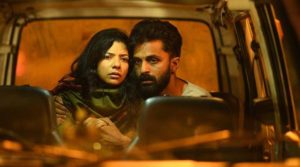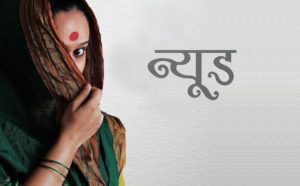NO ”˜Nude’ shows, NO ”˜Sexy Durga.’
 Sanal Kumar Sasidharan’s S Durga, previously called Sexy Durga, is among the two films which has been dropped by the I&B Ministry from being screened at the IFFI 2017. The other film is Nude.
Sanal Kumar Sasidharan’s S Durga, previously called Sexy Durga, is among the two films which has been dropped by the I&B Ministry from being screened at the IFFI 2017. The other film is Nude.
By Sudha Kumar
Two films ”“ ”˜Nude’ (Marathi) and ”˜Sexy Durga’ (Malayalam) were dropped by the Information and Broadcasting Ministry from being screened at the International Film Festival of India (IFFI) 2017 in Goa.
In Feb 2017 at the International Film Festival Rotterdam, Malayalam film ”˜Sexy Durga’ directed by Sanal Kumar Sasidharan won the prestigious Hivos Tiger Award. It was inspired by the horrific gang rape of a Delhi woman on 16 December 2012. Eight international films competed.
In July 2017 it was screened for certification and the CBFC certified it with a U/A classification and rechristened it ”˜S. Durga’ for fear that the word ”˜sexy’ might invite opposition from society. Following this, it was invited to be screened at the IFFI Goa, but surprisingly was completely dropped from the list along with Marathi film ”˜Nude’ in the eleventh hour. This was a Ministry of Information and Broadcasting decision.
The Jury Chairman of IFFI, Director Sujoy Ghosh and screen writer Apurva Asrani resigned from their Jury positions in protest.
The story of ”˜Sexy Durga’ weaves around a young couple who are trying to elope in the dark of the night, obviously because their relationship does not have the ”˜approval’ of their families. The whole film is the ”˜one-night journey’ of the couple as they travel through the most literate and emancipated state of Kerala. What seeps out of the otherwise banal dialogues and exchanges between the characters in the film, is the underlying message of sexual innuendo, of a patriarchal paradigm, of judgemental and censorious perspectives that rule social thinking and become social norm. It also shows the celebration of a religious festival in some southern regions of Kerala called ”˜Garudan Thookam’ (hanging of ”˜Garuda’- the mythological eagle), where men are intoxicated and then hung from metal hooks by the skin of their back, in order to satisfy the almost insatiable Goddess Kali.
As the country still swirled under the indignant spell of ”˜Padmavathy’s ghoomar’, the grounds on which Sexy Durga was not screened at the IFFI was fear of religious outrage, yet again.

”˜Nude’ is a Marathi film directed by Ravi Jadhav. It traces the life of a woman, who after fleeing from her husband, ends up secretly working as a nude model for artists in Mumbai at the Sir JJ School of Arts. It further shows her struggles to hide the truth about her profession from her family and son. The film also celebrates the beauty of the human body through an artist’s eye. In it Naseeruddin Shah, who plays a cameo, says ”˜One wears clothes to cover the body, not the soul. An artist is in search of the soul.’ It is a seminal statement.
A story that weaves poverty, oppression, beauty of the human form and social rejection into one tapestry of a narrative, gets rejected by a handful of minds in the real world, because of its title.
International Film Festivals across the world are held to acknowledge, critique and affirm thematic and aesthetic excellence in cinema. It is a platform for the promotion of film as an art. It is also a platform to express through cinema that which confronts and disturbs.
Padmavathi, Sexy Durga, Nude, Fire, Water – what is the common thread?
Is it perhaps an all-encompassing fear that a country and her people might lose their culture, their morality, their character just because their women, fictitious or otherwise, do not conform?
The same country where a woman cannot travel safely at night – whether for a medical emergency or to enjoy a movie, the same country where voyeurism reigns, where prostitution is not legalized and therefore criminal acts cannot be reported, where female foeticide is rampant, where child trafficking is the dark underbelly of urban societies.
The same country which worships the feminine form in all her grandeur for her beauty, grit and glory. The same country that mothered the first ever documented literature on human sexuality – The Kama Sutra.
It is the ultimate paradox as far as a woman is concerned. Mentally and emotionally shackled in gendered hierarchies, non-conformation met with constant humiliation and ostracising. One from which there is hope of slow freedom only through education and economic emancipation.
It is extremely difficult to challenge and question, as it requires a deep conviction and indomitable strength.
But it is far worse to remain silent.
Short URL: https://indiandownunder.com.au/?p=10256
